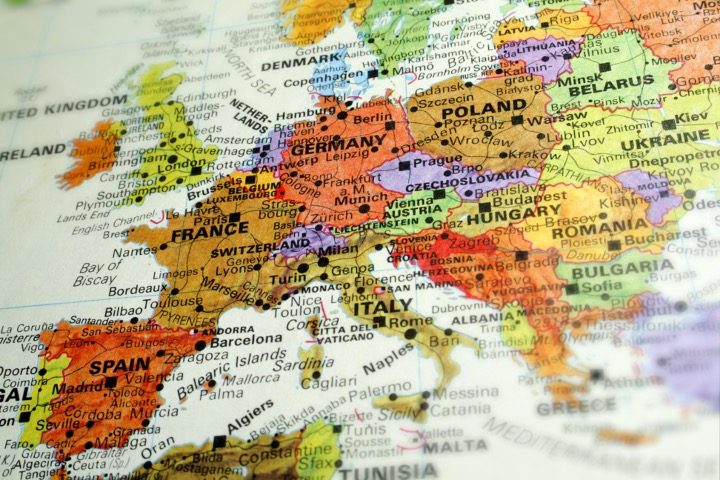
On October 23, Sahra Wagenknecht, who was a member of the German Bundestag for the leftist Die Linke Party, officially declared both her departure from the party and her plans to set up a new one.
Speaking to her audience at a crowded press conference in Berlin, Wagenknecht said: “We decided to found a new party because we are convinced that things cannot continue the way they are currently. Otherwise we probably won’t recognize our country in ten years.”
Moreover, she lambasted the policies of Germany’s old parties that have caused “unchecked migration,” which she slammed for worsening existing “problems in [German] schools and especially in poorer neighborhoods.” She also highlighted that the main reason for establishing her own political party was to reinstate rationality in matters of politics and economics.
Wagenknecht contended that the drop in industrial-value creation in Germany is mainly owing to the liberal-left “traffic light” coalition’s restrictions against Russia, and castigated Germany’s gradual global isolation because of its “foreign policy of finger-wagging.”
Another basic goal of the new party, Wagenknecht said, is to widen the “opinion corridor” in Germany. At the moment in Germany, “anyone who deviates from the dominant opinion bubble is quickly defamed and stigmatized.”
“That is unworthy of a democracy,” she announced, bemoaning the “pressure to conform” and singling out opinion polls disclosing that nearly half of Germans no longer dare to articulate their views out of fear of political, economic, and social repercussions.
The Sahra Wagenknecht Alliance for Reason and Justice is meant to serve as a launchpad to unveil Wagenknecht’s new political party, which aims to field candidates for the first time in the 2024 European elections, and then in elections in Germany’s eastern states of Saxony, Thuringia, and Brandenburg later in the same year.
Nine MPs from Die Linke are expected to join Wagenknecht to form the new party, including key members such as the present parliamentary group leader in the Bundestag, Amira Mohamed Ali; Bundestag member Christian Leye; and the former managing director of Die Linke in North Rhine Westphalia, Lukas Schön.
Mohamed Ali called the decision for a new party “necessary and right,” and stressed that those MPs who opted to join Wagenknecht had been “fighting for a long time to correct the course of [Die Linke] which has led it to political insignificance.”
MP Christian Leye told journalists that the new party will strive to garner votes among “people with low and mid-range incomes, pensioners, unionists, and works council members,” as groups such as these are currently underrepresented in German politics.
Before Wagenknecht and the nine MPs’ defection, Die Linke had 38 MPs in its parliamentary faction. According to Bundestag rules, a party needs 36 MPs to remain a faction. Hence, observers anticipate that Die Linke would most likely forfeit its parliamentary group status in the Bundestag due to the recent defections.
Wagenknecht has long championed peace with Russia and opposed providing arms to Ukraine. She is the third most-popular politician in Germany, with her party potentially obtaining up to 27 percent of the vote in federal elections, polls have divulged. The Die Linke Party is the successor to the SED party, which governed the German Democratic Republic (East Germany).
In nearby Hungary, Prime Minister Viktor Orbán commemorated the anniversary of his country’s botched 1956 uprising against the USSR by accusing the EU of trying to attain Soviet-like control and deprive Budapest of its identity. Hungary’s October 23 holiday memorializes the beginning of the 1956 revolution, which was clamped down by Soviet troops after only 12 days.
The Hungarian leader generally gives a speech on this day, and he has hitherto used the date to liken EU tactics to Soviet oppression. In 2022, Orbán predicted that the EU would share the same fate as the former Soviet Union.
“Today, things pop up that remind us of the Soviet times,” Orbán said in a speech on October 23 in the western Hungarian city of Veszprem. “Yes, it happens that history repeats itself. Fortunately, what once was tragedy is now a comedy at best. Fortunately, Brussels is not Moscow. Moscow was a tragedy. Brussels is just a bad contemporary parody.”
Orbán also maintained that Brussels has tried to enforce a version of liberal democracy that the Hungarian people have dismissed, elaborating that while the EU’s domineering ways date back to the Soviet era, the alliance cannot govern in a harsh manner.
“We had to dance to the tune that Moscow whistled,” the Hungarian leader said of his country’s four decades under Soviet control. “Brussels whistles too, but we dance as we want to, and if we don’t want to, then we don’t dance.”
Additionally, the prime minister hinted in his speech that Hungarians have a different perspective of freedom than their Western allies. “For Westerners, freedom means escape — get rid of yourself, get rid of what you were born into, change nation, change gender, change identity.” However, he added, for Hungarians, freedom is a “life instinct,” and they’re not willing to give up their identity. “The thought of not being a man, a Christian and a Hungarian is like tearing our hearts apart.”
Notably, Orbán has been at loggerheads with the EU on Russia embargoes, illegal immigration, and LGBTQ “propaganda,” among other issues. Just last week, he incensed Western countries by meeting with Russian President Vladimir Putin in Beijing. He has urged for a negotiated closure to the Russia-Ukrainian conflict, and has posited that sanctions against Moscow have impoverished citizens of EU countries.
Also on October 23, Hungarian Foreign Minister Péter Szijjártó rebuffed claims that Hungary offered Russia “sensitive” information about EU affairs, insisting that Hungary is a sovereign nation whose government does not follow dictates from abroad.
The minister was fielding questions by reporters on the fringes of the EU foreign ministers meeting in Luxembourg, and was questioned about European unhappiness regarding Orbán’s recent meeting with Putin. Orbán’s talks with Putin were the first in-person discussions Putin has had with a European leader since meeting with Austrian Chancellor Karl Nehammer in April 2022.



